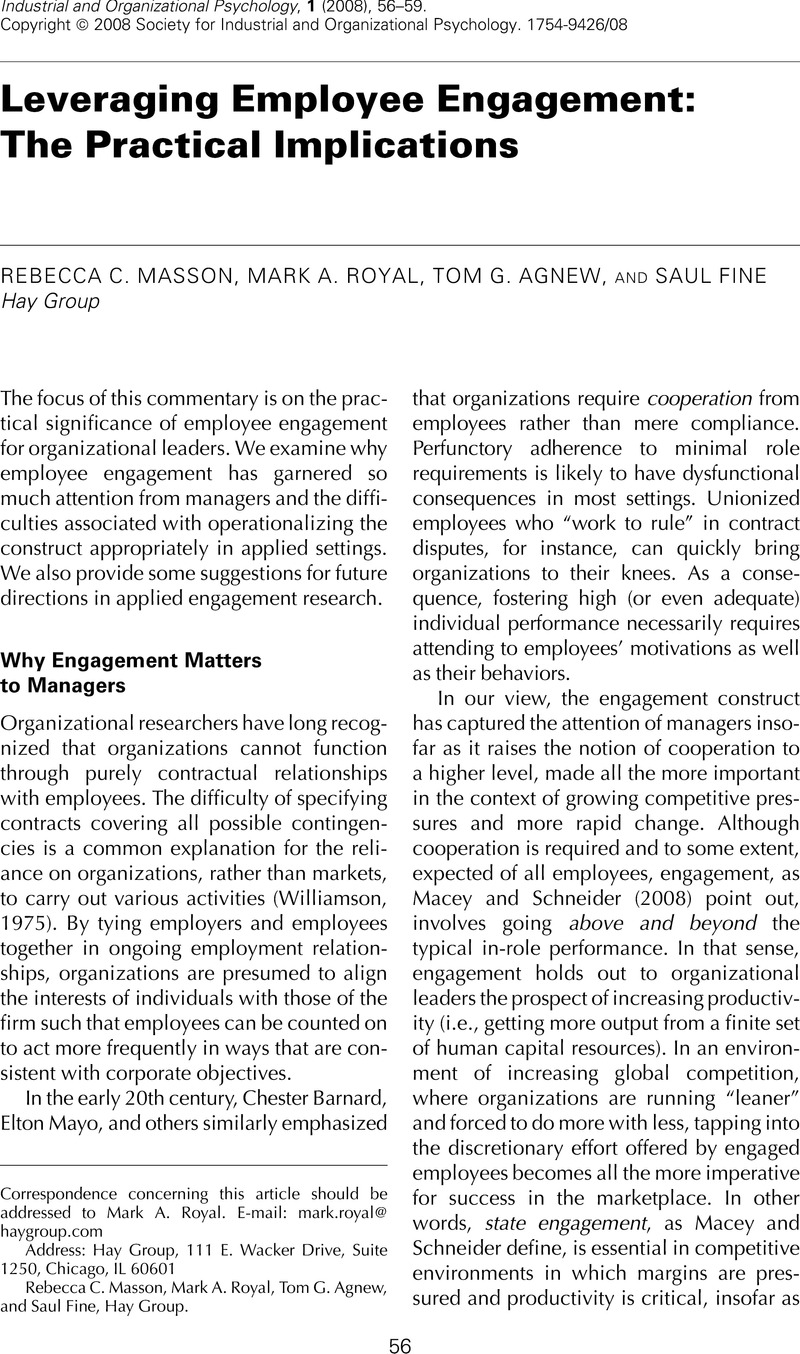Crossref Citations
This article has been cited by the following publications. This list is generated based on data provided by Crossref.
Macey, William H.
and
Schneider, Benjamin
2008.
Engaged in Engagement: We Are Delighted We Did It.
Industrial and Organizational Psychology,
Vol. 1,
Issue. 1,
p.
76.
Zigarmi, Drea
Nimon, Kim
Houson, Dobie
Witt, David
and
Diehl, Jim
2009.
Beyond Engagement:Toward a Framework and Operational Definition for Employee Work Passion.
Human Resource Development Review,
Vol. 8,
Issue. 3,
p.
300.
Fine, Saul
Horowitz, Ishayau
Weigler, Hanoch
and
Basis, Liat
2010.
Is good character good enough? The effects of situational variables on the relationship between integrity and counterproductive work behaviors.
Human Resource Management Review,
Vol. 20,
Issue. 1,
p.
73.
Walumbwa, Fred O.
Wang, Peng
Wang, Hui
Schaubroeck, John
and
Avolio, Bruce J.
2010.
RETRACTED: Psychological processes linking authentic leadership to follower behaviors.
The Leadership Quarterly,
Vol. 21,
Issue. 5,
p.
901.
Kernaghan, Kenneth
2011.
Getting engaged: Public-service merit and motivation revisited.
Canadian Public Administration,
Vol. 54,
Issue. 1,
p.
1.
Gruman, Jamie A.
and
Saks, Alan M.
2011.
Performance management and employee engagement.
Human Resource Management Review,
Vol. 21,
Issue. 2,
p.
123.
Chaurasia, Swati
and
Shukla, Archana
2013.
The influence of leader-member exchange relations on employee engagement and work role performance.
International Journal of Organization Theory & Behavior,
Vol. 16,
Issue. 4,
p.
465.
Kumar, V.
and
Pansari, Anita
2014.
The Construct, Measurement, and Impact of Employee Engagement: a Marketing Perspective.
Customer Needs and Solutions,
Vol. 1,
Issue. 1,
p.
52.
Hansen, Anne
Byrne, Zinta
and
Kiersch, Christa
2014.
How interpersonal leadership relates to employee engagement.
Journal of Managerial Psychology,
Vol. 29,
Issue. 8,
p.
953.
Griffin, Barbara
2015.
Collective norms of engagement link to individual engagement.
Journal of Managerial Psychology,
Vol. 30,
Issue. 7,
p.
847.
Eldor, Liat
and
Harpaz, Itzhak
2016.
A process model of employee engagement: The learning climate and its relationship with extra‐role performance behaviors.
Journal of Organizational Behavior,
Vol. 37,
Issue. 2,
p.
213.
Eldor, Liat
2016.
Work Engagement.
Human Resource Development Review,
Vol. 15,
Issue. 3,
p.
317.
Green, Paul I.
Finkel, Eli J.
Fitzsimons, Grainne M.
and
Gino, Francesca
2017.
The energizing nature of work engagement: Toward a new need-based theory of work motivation.
Research in Organizational Behavior,
Vol. 37,
Issue. ,
p.
1.
Byrne, Zinta S.
Hayes, Theodore L.
and
Holcombe, Kyla J.
2017.
Employee Engagement Using the Federal Employee Viewpoint Survey.
Public Personnel Management,
Vol. 46,
Issue. 4,
p.
368.
Pass, Sarah
2018.
Hidden Inequalities in the Workplace.
p.
279.
Kamboj, Shampy
and
Sarmah, Bijoylaxmi
2018.
Management Techniques for a Diverse and Cross-Cultural Workforce.
p.
132.
Islam, Talat
and
Tariq, Jawad
2018.
Learning organizational environment and extra-role behaviors.
Journal of Management Development,
Vol. 37,
Issue. 3,
p.
258.
Cain, Lisa
Tanford, Sarah
and
Shulga, Lenna
2018.
Customers’ Perceptions of Employee Engagement: Fortifying the Service–Profit Chain.
International Journal of Hospitality & Tourism Administration,
Vol. 19,
Issue. 1,
p.
52.
Saha, Koustuv
Reddy, Manikanta D.
Mattingly, Stephen
Moskal, Edward
Sirigiri, Anusha
and
De Choudhury, Munmun
2019.
LibRA.
Proceedings of the ACM on Human-Computer Interaction,
Vol. 3,
Issue. CSCW,
p.
1.
Magableh, Aya Naser
Omar, Khatijah
and
Al-Tarawneh, Jasem Taleb
2021.
The Big Data-Driven Digital Economy: Artificial and Computational Intelligence.
Vol. 974,
Issue. ,
p.
345.



